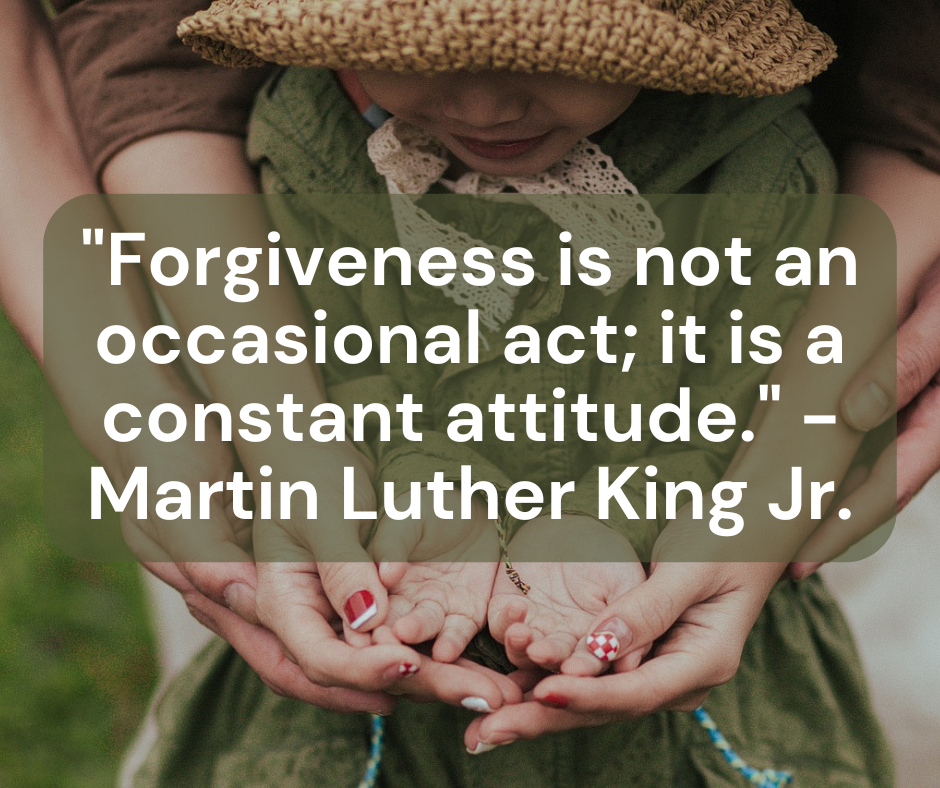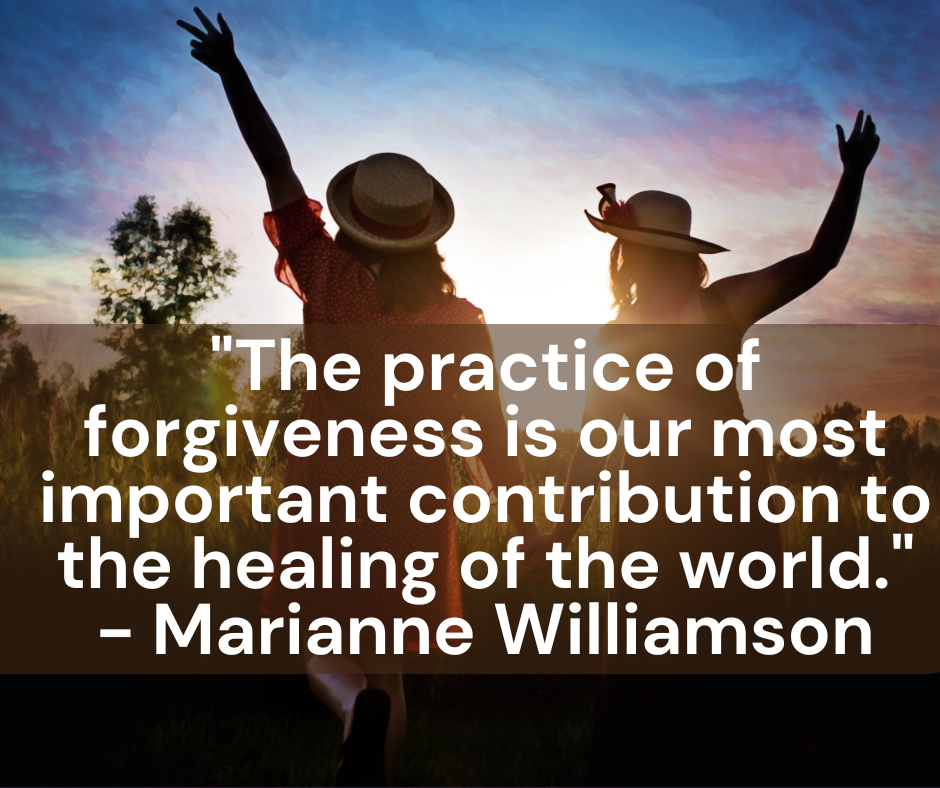Unlocking the Power of Forgiveness: Neurobiology Insights
Today, we have the opportunity to explore the neurobiological foundations behind practices such as mindfulness, compassion and forgiveness, which are found in many religious traditions. In a previous blog, we defined forgiveness as a conscious decision to release feelings of anger and resentment towards those who have unjustly harmed us. In this blog post, we will delve deeper into the science behind forgiveness and its potential to unlock the keys to Health, Wellbeing, Happiness, and Prosperity. As the saying goes, “if our mind works well, then everything works well.” Let us explore how practicing forgiveness can positively influence our overall health, with a particular focus on mental fitness.

Part 1: The Science Behind Forgiveness
- Explanation of the neurobiology of forgiveness: How our brain processes forgiveness and its impact on our mental and physical health. Most of us have a natural tendency to easily forgive in certain situations for example, many of us would easily forgive a young child or an animal that does something wrong but most of us, might find it challenging to forgive if we believe the perpetrator’s actions were intentional.
- On MRI:
- When we look at MRI scans participants who demonstrate greater levels of forgiveness on forgiveness tasks have higher levels of activation in those brain regions associated with top-down executive control functioning (dorsolateral and medio prefrontal cortex), self-referential processing, imagery and memory centres (percuneus) and Theory of Mind (TOM) mechanisms (temporal-parietal junction). The latter, TOM is known to be involved with our ability to imagine the feelings of other and “put ourselves in another’s shoes”. They also show that there is a correspond reduction in activation levels in regions of the brain association with the emotion of disgust (right anterior insular) an and language processing (inferior frontal gyrus).
- Reduction in Disgust leads to greater tolerance levels
- A possible explanation for why forgiveness might result in decreased activation levels in these regions are that when holding onto a grudge we place ourselves in a self-righteous position and in turn “see people“ as being disgusting. Also, it is thought that by ruminating over the incident keeps the memory active and alive and so, by increasing the activation levels we lower our levels of disgust. This should result in greater levels of tolerance and/or acceptance of ourselves and others.
- How Mindfulness and Compassion practices lead to forgiveness
- Furthermore, MRI studies using compassion and mindfulness to facilitate cognitive processing and emotional regulation tend to replicate these results. In these cases forgiveness is often an added benefit the participants experience. Thus, should we struggle with forgiveness then applying mental practices that build brain capacity i.e. mindfulness will go a long way in supporting our capacity to forgive in the future.
- On MRI:
- The Neurochemistry of Forgiveness: How our hormones set the stage to facilitate the process of forgiveness.
- The release of Oxytocin:
- Oxytocin often referred to as the “bonding hormone” promote feelings of trust, empathy, and connection (bonding) has been found to be released when we forgive. In my time as a midwife, we learnt that Oxytocin was the hormone that cause contractions in pregnancy however, research now shows that Oxytocin does so much more. Both women and men release Oxytocin in caring situations but it is not limited to humans as it has also been found to be throughout the animal kingdom where care-taking is involved. Oxytocin actively helps to break up old patterns and rewire new neural circuitry. Many mothers immediately forget about the pain of birth when they hold their child and this is because of Oxytocin.
- Oxytocin is present in a number of brain regions but what is surprising is that it is present in the amygdala which is an area, that plays a pivotal role in fear triggering. Oxytocin is thought to reducing fear by increasing our level of trust. In an experiment where 49 males were engaged in a trust versus betrayal task, those participants that were given a drop of Oxytocin prior to testing did not diminish trust when they were betrayed in comparison to those that had received a placebo. It seems that Forgiveness requires us to trust no only ourselves but that others will not hurt us again. By diminishing the painful memory we’re not clouded by the past, fear drops and connection can happen.
- Decreased stress response:
- Forgiveness reduces cortisol levels, a stress hormone which leads to improved overall wellbeing. In my blog Forgiveness and Healing Mother Wound I mentioned both stress hormones and cortisol cross the placental barrier which can lead to changes in the baby’s brain neurology but of course, these hormones also affect the mother.
- The main stress hormones, Adrenalin (epinephrine) and nor-Adrenalin (nor-epinephrine) are rapidly released in high concentration levels mainly to galvanise your body into action. This is so you can either fight or flee from the situation. These hormones are very quickly metabolised but also, constant pumping out of Adrenalin and nor-Adrenalin is not sustainable and so our, body utilises the hormone, cortisol to support us. Cortisol levels are slow to rise and slow to drop and therefore helps to keep the system stable. Cortisol mediates our stress by metabolising fats, proteins and carbohydrates to raise blood sugar levels so we can have more energy to survive. It also is very helpful in suppressing inflammation but there is a catch, chronic high levels of cortisol can lead to problems such as, insulin resistance, diabetes, osteoporosis, high cholesterol, cardiovascular issues and even psychosis. Thus it is crucial that we get back into balance as quickly as is possible.
- The release of Oxytocin:
Part 2: Explanations behind Forgiveness and Emotional Wellbeing
- The power of letting go:
- Forgiveness can help us release negative emotions and resentments, providing emotional freedom during the pregnancy journey. I prefer to think of letting go as “choosing a pathway lead by love”. Evidence shows forgiveness diminishes fear and increase connection. Essentially when we forgive we move “away from fear towards love”. Connection releases Oxytocin, which helps to disconnect away for fear and rewire our brain towards empathy, compassion and love. It is also a powerful analgesic which might also diminishes the memory of the pain we have experienced making the process of forgiveness easier.
- Healing from past traumas:
- Forgiveness can play a crucial role in our healing process, allowing professional women to move forward with greater resilience. Courage and fortitude are often byproducts of forgiveness as with understanding also comes a sense of personal power. We can determine where to allocate our energy so that we harness it with greater efficiency and productivity.
- Nurturing positive emotions:
- Forgiveness has been shown to increase feelings of compassion, gratitude, and happiness. Nurturing by definition means nourishing by care-taking. When we are feeling nurtured we feel safe. There is no longer any need to keep ruminating over resentments of vengeful thoughts thus the constant reminder that a stressful situation is present is absent and fear is reduced. This gives us space to rest, relax and receive.

Part 3: Forgiveness and Physical Health
- Boosting immune function:
- Research on the effects of forgiveness on the immune system shows there is increased resilience in our overall physical health and in the case of pregnancy more so. This may see counter intuitive given that earlier I mentioned cortisol, Adrenalin and nor-Adrenalin also help the immune system. This is a little complex but when we are in “fight mode” our body will fight everything and even ourselves, this is where autoimmune conditions start to become a reality because there isn’t a filter to tell us what is “me and not me”. [Chapter 14, pg 225] When we are in peace mode everything is slowed down and the body can take its time to decipher – it can discriminate between “me and not me” and then choosing which is which it can go about doing normal body processing.
- Lowering blood pressure:
- Forgiveness has been shown to reduced blood pressure levels which result in a healthier cardiovascular system. Chronic stress results in cholesterol dysfunction which over time affects the whole body’s ecosystem, blood pressure is one of the fist real indicators that we are chronically stressed. However, when we forgive we release ourselves of the fear and de-activate the continuous re-triggering of the fear response.
- Enhanced sleep quality:
- Forgiving often allows for improved sleep patterns. Chronic lack of sleep results in permanently raised cortisol levels which are shown to adversely affect our overall health and vitality. For a pregnant woman lack of sleep will also affects her baby’s circadian rhythm because her sleep time is when the baby maximises its nutritional absorption and utilisation. This may result in an under or over weight baby.
Part 4: The Path to Prosperity
- Cultivating self-compassion: How mirror neurons affect business.
- Forgiveness, both towards others and oneself, generally increased our capacity for greater self-acceptance and self-love. Part of having a successful business is understanding mutual reciprocity which relies on a social “mirroring effect” reciprocal behaviour. We all have “mirror neurons” which are designed to mimic other people. To feel for other we need to physically “feel” what they are feeling, this is the embodiment part of empathy. So, if we don’t feel safe or secure their “mirror neurons” will mimic that unsafely in their body and they will react accordingly and we might lose business. We need to be congruent and confident for other to feel safe in our presence. Self-acceptance makes us feel safe and confident. Thus, we aren’t easily triggered by others reactions and so can stay calm. Having greater flexibility helps us to build deeper connection that engender reciprocity. This often paves the way for personal and professional growth.
- Strengthening relationships: We are only as strong as our weakest link
- Forgiveness helps to also build and maintain healthy relationships and support networks which are crucial for professional women on their pregnancy journey. Many women have moved to where their work is and are often isolated from their family support networks. For a baby foetus to grow a healthy resilient brain a mother needs to feel safe, supported and loved.
- Embracing a positive mindset: Mood dictates everything
- Having a tendency to forgive easily helps us to have an optimistic outlook on life. It has also been shown to positively correlate with increased productivity, creativity and success in many aspects of life since.
Final thoughts
Forgiveness has a remarkable impact on our mental fitness and overall wellbeing, especially during one’s pregnancy journey and by, understanding the science behind forgiveness and its connection to emotional and physical health, professional women can embrace forgiveness as a powerful tool for personal growth, happiness and prosperity. Moreover, that forgiveness helps in letting go of negativity, heal emotional wounds, cultivate compassion which potentially facilitates a successful and fulfilled pregnancy journey.
Also, that forgiveness not only benefits professional women individually it creates a ripple effect that positively influences their relationships, work-life balance, and overall success.
Most importantly it is crucial to remember, practising forgiveness is a journey, a conscious choice that empowers us to create a brighter future for ourselves and the unborn child. But we must acknowledge that forgiveness doesn’t happen overnight and that to forgive we often need other perspective which we can’t always do for ourselves. This is when we need professional support, I offer mental fitness and psycho-therapeutic coaching to help give you that a non-judgmental outside perspective to navigate your journey.
If this article resonates then book yourself in for introductory chat. In a safe container we can meet and find out what you want and how you to achieve that outcome. In this session we will explore where are your potential blocks (your biggest gaps) and what is in season to work with right now. Timing is everything but if there are too many gaps gaps in your energetic field i.e. relationships, fun, happiness those blocks will just keep pulling you back. We need to know where to tap to make the biggest difference for you in attaining your outcome.
If you are ready to let go of the pain and start living your best life please click on the link and book in for the call. I would love to support you on your journey.
Some Questions and Answers:
- Why is forgiveness particularly relevant for professional women and mothers?
- Forgiveness is relevant because professional women and mothers often face unique challenges and societal pressures, and forgiveness can help them navigate these situations with greater resilience and wellbeing.
- How does forgiveness impact our physical health?
- Forgiveness boosts immune function, lowers blood pressure, and enhances sleep quality, all of which contribute to better physical health and vitality for professional women and mothers.
- How can forgiveness support professional success?
- By cultivating self-compassion, forgiveness empowers professional women to embrace personal growth, strengthen relationships, and foster a positive mindset, ultimately leading to greater success in their careers.
- What are some practical techniques for practicing forgiveness?
- Techniques include reframing perspectives, practicing empathy and compassion, journaling, seeking support from others, and engaging in mindfulness practices to enhance mental capacity for forgiveness.
- How can forgiveness positively influence the relationship between professional women and their children?
- Forgiveness allows professional women to create a nurturing and supportive environment for their children by letting go of negative emotions, promoting emotional balance, and modelling resilience and compassion.

